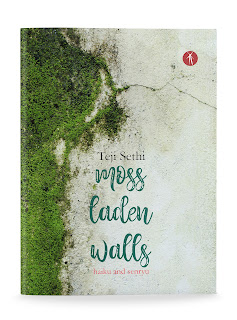Moss Laden Walls: A Review
by Dr. Pravat Kumar Padhy
By Teji Sethi, (Hawakal Publishers, 2021). 107 pages;
ISBN: 978-93-91431-05-1. Price: Rs. 350, USD 14.99, Available on Amazon
Teji Sethi is a bilingual poet and anthologist. Her haiku are often illustrated by the sense of wabi-sabi (aesthetics of natural simplicity and solitude). She is emotional and the memories strike the note in her poems:
moss-laden walls her fingers trace remnants of the
past (p. 9)
It reminds me how closely it makes a poetic parallel
with the haiku written by Gabi Greve: mossy steps overgrown by time and
loneliness
She has intelligently engaged the sense of touch,
sight, smell, sound, and taste:
autumn breeze …
her forehead still moist
with the parting kiss (p. 12)
Creativeness and contrast imageries have been often
enamored as poetic metaphors when she presents:
Ganga aarti …
a million suns
sink into darkness (p. 18)
She often blends science with poetic symbolisms when
she awaits the rhythm of the moon and tides:
new moon
the stillness of sea
awaits a tide (p. 37)
She is bold, evocative, and paints womanhood with
sharp contrast:
menopausal blues
it is not
red always ( p. 45)
She is equally brilliant in crafting senryu with a
touch of wit and human attributes:
shelling peanuts
neighbours once aggrieved
share a gossip (p. 43)
therapy session
with her autistic son
she learns to tie a lace (p. 53)
Teji writes haiku with lightness (karumi) and elegance
(fuga). She articulates vividness through the art of juxtaposition.
mango orchard
the planter sings back
to the cuckoo (p. 49)
origami swans …
father shares
it is time to depart (p. 89)
migratory birds …
carrying home
a piece of sky (p. 91)
She has also tried a 4-line haiku (haiqua): bus ride …
/ waving at a friend/ I grab/ a handful of wind (p. 81) and an experimental
vertical array in the haiku on pandemic (p. 87):
tree sap the life in quarantine d me out
r
a
i
n
s
Teji recalls the trauma of partition of India in haibun,
‘Tapestry’ and ‘Fragments’. The tanka prose ‘The Road Not Taken’ is a brilliant
piece of reminiscence. She enumerates the contrast between the crowded modern
city and the serene silhouettes of the mountain range. The concluding tanka
manifests the ‘dreaming room’ (to quote Dennis M. Garrison). a beam of
moonlight sieves through the window … the mesh of relationships I have lived
all these years
When she writes, “a tender plant/ pushes through the
cracks/ cemetery” (p. 21), I recall the ray of optimism portrayed by Issa:
moss blossoms
blooming a little crack...
stone Jizo
Kobayashi Issa (Tr. David Lanoue)
Publication: triya Magazine, 2021

No comments:
Post a Comment